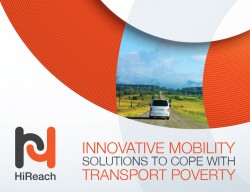HiReach - Innovative mobility solutions to cope with transport poverty
Over the last few decades, the social dimension of transport had been receiving little attention in both academic and policymaking circles. Increased focus on the relationship between social disadvantage and mobility-related disadvantage has led to the term “transport poverty”, representing a concept that still needs to be fully defined. Inadequate transport facilities negatively affect personal mobility. The availability of transport options is vital for employment and basic services, as well as for maintaining social ties and leading a meaningful life. Transport-related deficiencies affect individuals and groups differently according to different economic, social and cognitive parameters. Socio-economic, socio-demographic and gender considerations must be factored in when designing suitable solutions, as well as people’s perceptions and aspirations. As transport access and social inclusion are mutually interdependent, transport poverty can feed social exclusion, spurring a vicious cycle that further disadvantages those in need. Living in urban, rural or peri-urban areas which all have different needs also affects both an individual’s transport difficulty and social position. Furthermore, spatial and social conditions vary significantly across and within European Member States. Hence, it is important to view transport poverty in a local context, identify common transport poverty elements across Europe and design joint solutions to eliminate it. THE HiReach SOLUTION HiReach (http://hireach-project.eu/) a Horizon 2020 3-year Research and Innovation Action (RIA) running from 2017 to 2020, aims to eliminate transport poverty by triggering new mobility solutions. HiReach builds on the potential of bundling and mixing dispersed, special and non-coordinated/optimised trip requests and needs from different vulnerable user groups to favour inclusive and participative mobility rather than exclusive/special and geographically limited mobility. The vulnerable user groups within HiReach include: • People with temporarily or permanent reduced mobility • Children and young people • Elderly people • Women • Migrants and ethnic minorities • Low income and unemployed • People living in rural and deprived areas By combining different attributes of available transport concepts and bottom-up initiatives with new operational schemes and IT applications, HiReach will explore viable business models for small-scale, modular and easily replicable mobility services (e.g. community transport services, ridesharing, minibus/van pooling, etc.) that can be provided at affordable prices and/or with minimum subsidies. FOSTERING SOCIAL INNOVATION PROCESSES HiReach fosters social innovation processes through an in-depth (micro)analysis of capabilities and attitudes of different social groups and their direct involvement as co-users and co-owners of the proposed solutions. Their involvement will be put in relation with the HiReach mechanism for exploring, generating and testing new solutions based on creative concepts of start-ups and innovative entrepreneurs. To secure the viability and scaling-up of new business models, HiReach will provide open source tools, guidance and support to developers as well as testbeds for new inclusive mobility solutions jointly prepared by start-ups, policymakers and local communities. The legislative and regulative implications of newly developed collaborative economy solutions will also be assessed in order to find the right balance between peer-to-peer/self-produced services vs commercially operated services, including the role of marketplace providers. Check HiReach infographic here: https://bit.ly/2PrhMiq
Keywords
transport poverty, social inclusion, mobility, innovative solutions, business models, mobility services
Countries
Belgium, Germany, Greece, Italy, Luxembourg, Portugal, Romania



